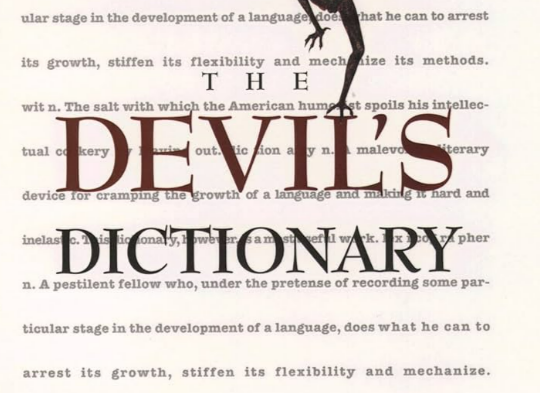The Devil’s Dictionary
Chapter 11
byChapter 11 begins with a tone soaked in seasonal gloom, as November is framed as a metaphor for emotional and existential fatigue. Bierce uses the month not just to mark time, but to evoke the sense of decay, monotony, and slow decline often associated with aging or disillusionment. It reflects a psychological landscape where enthusiasm fades and routine sets in, mirroring the collective sense of weariness that society often denies. The choice is not coincidental—he aligns nature’s transition into barrenness with human resignation. In doing so, he reveals how even calendars can carry philosophical weight when viewed through a cynical lens.
The definition of Oath pivots between solemnity and mockery, exposing the contradiction in how promises are treated under the law. While oaths are legally binding, Bierce observes they are often violated without consequence, especially by those in power. This redefinition critiques the performative nature of integrity in legal and political systems. He questions whether truth matters when lies are routinely rewarded and rarely punished. Oblivion, meanwhile, is portrayed as the final home of all ambition—a state not of peace, but of irrelevance. Fame, greatness, and effort, no matter how grand, eventually dissolve into silence. Bierce’s treatment is not mournful, but detached—he presents anonymity as life’s inevitable destination.
With Observatory, he jests at astronomers, portraying them as seekers of answers in the cold and distant sky, while earthly problems go unresolved. It is a playful nudge at how science, while noble, often overlooks the immediate in pursuit of the remote. In Obsessed, he reinterprets historical possession as the dramatization of delusion, perhaps even a metaphor for society’s fixation on irrational fears. This ties into his broader critique of superstition, religious dogma, and the need to label the unfamiliar as evil. Bierce suggests that what we call obsession might be nothing more than passion misunderstood or misused.
Obsolete and Obstinate are paired for a reason—each reveals resistance, either to change or to letting go. Bierce sees outdated words not as quaint relics, but as stubborn echoes of outdated thinking. To him, language that clings to the past mirrors people who resist progress. Obstinate then becomes more than stubbornness—it’s a kind of intellectual paralysis, a refusal to move forward even in the face of evidence. These entries work together to frame human rigidity as a weakness masked as principle. Bierce’s wit here challenges readers to question whether they honor the past or simply refuse to outgrow it.
The entry Occasional lampoons poetry written for events, like birthdays or ceremonies, as shallow exercises in vanity. Bierce mocks these literary attempts as lacking depth, suggesting they serve applause more than insight. For him, creativity tied to obligation rarely produces lasting art. In Ocean, he presents vastness not as awe-inspiring, but as evidence of life’s insignificance and nature’s indifference. The romanticism of the sea is stripped away, leaving behind an endless, unfeeling force. This view recasts nature from a source of beauty to a backdrop of human futility.
Offensive serves as a double entendre—touching both on military aggression and social discomfort. Bierce suggests that civilization’s advancement often includes increasing its ability to irritate or invade. Similarly, Old is treated not as wise or venerated, but as a slow fading of relevance and respect. He captures how society treats aging: not as a gain in wisdom, but as a loss of use. His observations are not cruel but expose the shallow metrics by which people assign value—productivity, appearance, and novelty.
Few entries in the chapter cut deeper than Optimist and Optimism. Bierce defines them not as hopeful, but as deluded. The optimist is someone so committed to denying reality that only death can free them from their fantasy. This satire challenges the modern self-help culture, which often masks discomfort with positivity rather than addressing it. Bierce’s view may seem grim, but it highlights the danger of ignoring problems under the guise of “looking on the bright side.” For him, facing discomfort is not pessimism—it’s clarity.
The chapter ends on a strong note with Oratory and Orphan. Oratory is framed as theatrical language designed more to seduce than to inform. Bierce sees speech as a tool of manipulation, especially in politics, where eloquence often disguises hollow agendas. Orphan, while sympathetic, also reveals the hypocrisy of public compassion. Bierce critiques society’s tendency to glorify charity while doing little to alter the systems that cause suffering. It’s not kindness he mocks, but the self-serving form of it that seeks recognition more than relief.
In this chapter, Bierce continues his masterful balancing act—drawing humor from the darkest corners of language and life. Every word is a scalpel, slicing through societal illusions and sentimental pretenses. His satire is never simply cruel; it is diagnostic, designed to reveal flaws we often ignore or excuse. By reframing definitions, he forces a reevaluation of what we value, fear, and pretend to understand. The result is a body of work that remains unsettlingly relevant—proof that human contradictions, once named, become impossible to unsee.


0 Comments